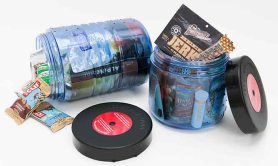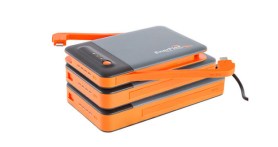

As recently as the turn of this century, the only extra batteries you worried about on a camping trip were the ones you needed for your flashlight. But since then, we’ve come to rely more and more on electronic devices. Weather alert apps, GPS, and apps for hunting and fishing have all become essential for getting the most out of your time in the great outdoors. Not to mention, you need your phone for making pre-planned check-ins with friends and family.
Videos by Outdoors
All of those uses require power, so you’re going to need a backup power supply. But which is better, an external battery pack or a solar charger? The debate between external batteries vs. solar power is longstanding, and won’t be going anywhere soon. Let’s take a look at what each device has to offer.
Pros and Cons of External Batteries
Depending on your needs, a typical external battery pack should be sufficient for a weekend camping trip. A 25,000mAh charge pack, for example, can recharge an iPhone XS Max 4 ½ times, and a Samsung Galaxy Note 9 4 times. That’s more than enough juice to keep using all your favorite apps, and even for watching a movie before bed, although we personally prefer to minimize screen time on a camping trip.
Before modern Lithium-Ion batteries, a power pack with this capacity would have needed to be the size of a car battery; not exactly something you want to bring with you on a camping trip. Nowadays, a powerful battery pack can be as small as your cell phone, which means it’s a trivial addition to your backpacking kit.
Of course, the downside of a power pack is that it needs to be plugged in to recharge. So if you’re hiking the entire Appalachian Trail – or just spending a week in the wilderness – you’ll probably run out of juice while you’re still out in the woods. And while there’s nothing stopping you from carrying two, three, or more power packs, the bulk and weight will start to add up.
Pros and Cons of Solar Power
A portable solar charger, on the other hand, can produce virtually infinite power. Now, there are two types of solar chargers on the market. Some, like the Be-charming charger we linked to, include a powerful built-in power bank. Others are more compact and lightweight, but only have a small battery. This second type is worthwhile if you’re a serious survival prepper, but tends to be inconvenient for camping, since you’ll have to keep your phone plugged in while the charger is exposed to the sun.
For backpacking, since you’re liable to be on your feet all day, it’s important to choose a solar charger that can be mounted on your backpack. This way, you can keep the charger’s power bank charging all day, and top off your phone once you’ve made camp for the night.
Another useful feature to look for is the ability to charge the power bank directly from a USB cable. This way, you can easily top off your solar charger while you’re at home, and you’ll only need to rely on the solar panels for use in the field.
There’s a reason you want such a powerful built-in power bank: solar chargers, even larger, folding solar chargers, are fairly slow. Assuming they’re in direct sunlight all day – good luck with that – you’ll be able to get about half of a full charge on a newer iPhone. That’s better than nothing, but at the end of the day a solar panel is better as a backup, not as your primary source.
That said, solar power packs do have a distinct advantage over a traditional USB power pack: they require no external power. If you’re looking to power a small radio or other survival tools in a real-world emergency, a solar charger will get the job done. In the aftermath of a natural disaster like Hurricane Katrina, even a small amount of electricity can make the difference between life and death.
Wrapping Up
When it comes to the question of external batteries vs. solar power, it’s really a matter of what you need. For most people, modern battery technology means that a portable battery pack can carry plenty of juice. Even if your phone is running multiple apps and you’re burning through data like there’s no tomorrow, you’ll still be just fine for a weekend.
On the other hand, there’s a time and a place for a good solar power pack. While they don’t provide a huge amount of power, they work anywhere there’s sunshine. At the very least, you’ll be able to eke out enough battery life to place an emergency phone call. Just don’t depend on solar power for running your GPS all day.









